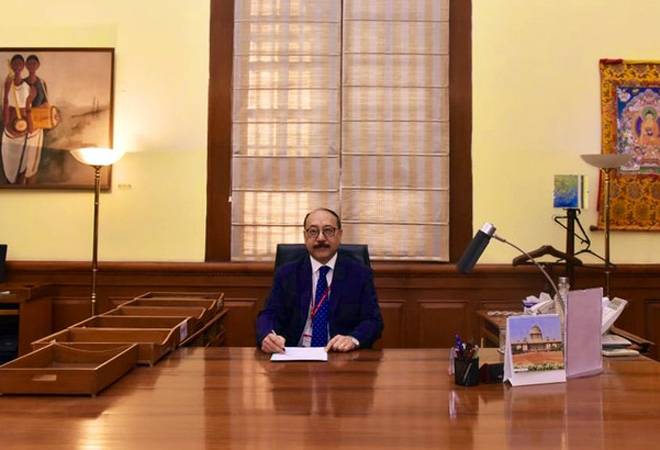
Foreign Secretary Harsh Vardhan Shringla has said that India welcomes the evolution and rise of Africa as a key factor in the contemporary world and are committed to supporting African countries in this endeavour, as per African priorities and without conditionalities. “This is in keeping with the Ten Guiding Principles of India’s engagement with Africa, as enunciated by Prime Minister Narendra Modi in his address to the Parliament of Uganda in July 2018. India will continue to support Africa’s aspirations and work towards empowering Africa for a future that is founded on the principles of inclusivity, sustainability, transparency, and socio-economic development with dignity and respect,” Shringla said at the UN Security Council Open Debate ”Challenges of maintaining peace and security in fragile contexts”
He observed that while democracy is undoubtedly gaining ground in Africa, especially through peaceful transfers of power, African countries, particularly in the Sahel, Central Africa and the Horn of Africa continue to face complex challenges. The principal driving factors are chronic political instability; weak governance structures; institutional weaknesses; ethnic divisions; and the presence of terrorist and armed groups. Over-exploitation of diminishing resources, mainly in the Lake Chad basin and Great Lakes region, are also exacerbating the problem. The Libyan conflict and resulting instability continue to have a negative impact on its neighbours. The Covid-19 pandemic has only made the situation worse in some countries.
He said that the debate provides an opportunity to reflect on fragile situations, particularly in the African continent and made the following observations:
i. First, let us not fail to acknowledge that the legacy of colonialism constitutes the foundational basis of the current instabilities that plague the African continent.
ii. Second, we should not paint all fragility issues with the same brush. We are primarily concerned with situations directly affecting the maintenance of international peace and security.
iii. Third, full respect for national ownership can never be over-emphasized. We should recognize the primacy of national governments and national ownership in identifying and driving priorities, strategies and activities for sustaining peace.
iv. Fourth, the Security Council should remain respectful of the regional approach adopted by countries, in collaboration with regional organizations to address common challenges. The African Union, has a leadership role to play in consolidating peace and post conflict reconstruction in Africa. The collaboration between the UN and the African Union and sub-regional organizations, such as ECOWAS, ECCAS, SDAC and IGAD, has yielded positive results. The African Union Policy Framework for Post-Conflict Reconstruction and Development (PCRD), informed by lessons learned from past mistakes as well as best practices, offers a roadmap towards sustainable peace and development. The African leadership has already taken important initiatives such as the ‘High Level Panel on Fragile States’ to respond to the needs of countries in a flexible and rapid manner.
v. Fifth, we need to ensure that the UN and its presence on the ground, its Peacekeeping Operations and Special Political Missions, are sufficiently mandated and resourced to implement a comprehensive understanding of peace and security. Having contributed significantly to UN peacekeeping in Africa for six decades, we have seen how peacekeeping missions are struggling to implement ambitious mandates. Peacekeeping missions should have a clear and well thought out exit strategy.
vi. Sixth, it is important to actively support the post-conflict reconstruction agenda of Africa. In this regard, the UN Peacebuilding Commission’s efforts should be strengthened. Their efforts should be to prioritize the focus of UN efforts and coordinate the role of international financial institutions, the private sector and civil society organizations.
vii. Seventh, the role of technology, especially digital technology, to improve public services, promote transparency in governance and enhance the reach of democracy, human rights and gender sensitivity has not yet been sufficiently appreciated and factored in. COVID has brought us unparalleled grief but also helped us to do things differently. We need to factor in technology with a human face in this mix.
viii. Finally, Africa today is facing serious challenges posed by the growth of terrorism, particularly in the Sahel and Horn of Africa. In this regard, initiatives such as AMISOM, G-5 Sahel Joint Force and Multinational Joint Task Force (MNJTF) need more robust support from the Security Council and the international community.
Foreign secretary informed that under India’s development partnership with Africa, India has reached out to 43 African countries; have executed 189 developmental projects in 37 African countries; and around 77 projects are under execution with a total outlay of US$ 12.86 bn. At the 3rd India-Africa Forum Summit held in 2015, India announced US$ 10 bn in Lines of Credit (LOCs) and US$ 600 mn in Grant Assistance to African countries. India has committed US$ 1.7 billion as soft loans for solar projects, including in Africa, as its commitment to the International Solar Alliance. India has offered 50,000 scholarships to African students. Premier Indian institutions and hospitals have been linked to 16 African countries to offer tele-education and tele-medicine services through the e-Vidya Bharati and e-Arogya Bharati portals.
India has supplied critical medicines to several countries in Africa to help them fight the COVID-19 pandemic. India has also responded to the call of the Secretary General and have upgraded its peacekeeping hospitals in the DRC and South Sudan during the peak of the pandemic.
He shared that India has always supported African entrepreneurship and market access. India was the first developing country to provide duty free, quota free market access to LDCs which has been available over the years to 33 countries in Africa. India is Africa’s third-largest export destination. Indian companies have invested over US$ 54 billion in Africa and created hundreds of thousands of employment opportunities. India is also extending debt relief to African countries under G-20 initiative.